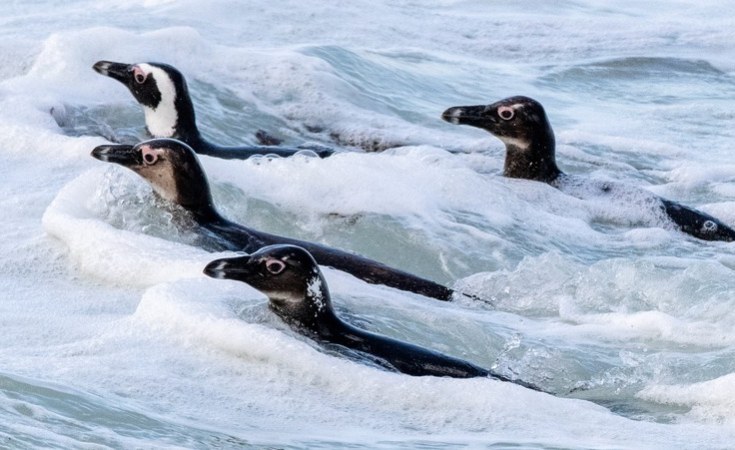Beach goers spotted an unusual red and black tourist at Swakopmund's Mole Beach on Saturday, that happened to be lost among human habitat.
Jessica Kemper of the Lüderitz Marine Research Institute, which works with the Ministry of Fisheries and Marine Resources, says the African penguin was not only exhausted, but also injured.
"The penguin had a wound, though it's unclear how it was caused - possibly a propeller, seal, or even a shark attack. That bird is now being cared for," she said yesterday.
The endangered bird was rescued by the Namibia Marshal Rangers coastguard division.
Ranger Sean Naude was conducting patrols along the coast when he received a report of a distressed penguin perched on the
breakwater at the Mole.
Upon arrival, he discovered the endangered penguin stranded far from its natural habitat and in a state of severe exhaustion.
"It was very tired, but we managed to calm it down," Naude says.
He further says there were initially reports of two stranded penguins, but one returned to the ocean.
Conservationists familiar with penguin rescue and rehabilitation were contacted to take over the penguin's care.
Once rehabilitated, the bird will be transported and released back into its natural habitat, likely near Lüderitz over 500 kilometres away.
Naude expresses gratitude for the public's role in reporting the incident.
"It's my first penguin rescue, but we're always thankful when people alert us to these situations," he says.
Meanwhile, Kemper explained the challenges faced by young penguins, particularly after they fledge.
"Once the chicks leave the nest, they're on their own. No one teaches them how to catch fish, and their survival depends on how quickly they can learn. But the ocean conditions have changed.
"They follow cues like sea temperature and chlorophyll concentrations, expecting to find fish, yet the fish are no longer where they should be," she said.
Kemper said many young penguins, like the one found at Swakopmund, end up far from their usual range due to these conditions.
"Historically, penguins would travel north along the Namibian coast, sometimes as far as Cape Cross or Angola, but now they arrive weak and hungry. "The current ecosystem no longer supports their needs," she said.
Kemper also addressed the broader crisis facing African penguins, warning that they are on the verge of functional extinction.
"If the current rate of decline continues, penguins in Namibia and South Africa could be functionally extinct by 2035.
It's primarily due to dwindling fish stocks, but also factors like pollution, climate change, and habitat destruction.
We are very close to losing them," she said.
Kemper stressed the importance of minimising stress during bird rescues.
"People tend to think penguins are cute, like something out of 'Happy Feet', but they are wild animals.
Stress is a serious issue for them, especially when they are already weak or injured. We ask that people avoid loud interactions or showing the birds to the public, as it only exacerbates their condition."
Kobus Bekker, a rescue volunteer based at Walvis Bay, confirmed that penguin rescues have become more common in recent weeks.
"We've saved six penguins recently, mostly at Walvis Bay.
Penguins on the beach are always in danger, because they're easy prey for predators, especially when they're moulting and unable to swim," Bekker explains.
According to Naude Dreyer of the Ocean Conservation Trust, moulting penguins lose their waterproof feathers and require two to three weeks on shore to grow new ones.
"If they're forced into the water too soon, they can develop hypothermia.
The birds we've found at Swakopmund and Walvis Bay were likely blown off course by strong winds and carried along the northward Benguela Current," Dreyer says.
This incident is part of a broader effort to protect the African penguin, which is critically endangered reportedly due to dwindling food resources.


